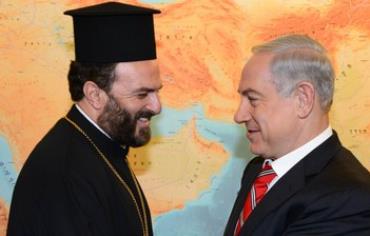Motive of attack still not certain; Father Nadaf has been subject to death threats in the past.

A 21-year-old Nazareth man is suspected in the attack of the son of
a Greek Orthodox priest who supports enlistment of Christian youth in
the IDF.
The attack occurred in Nazareth last
night where the priest's 17-year-old son was allegedly attacked by the
suspect with a rod, according to Channel Two.
he youth suffered bruising to much of his body and was sent to the English Hospital in the city.
Father
Nadaf is openly active on behalf of the integration of Arab Christians
into Israel’s mainstream and is the spiritual leader of a forum for the
enlistment of Christian youth in the IDF. He has been excommunicated by
the Orthodox Church Council, subjected to death threats and has been the
target of verbal attacks from Arab MKs.
After
the attack on Friday, the priest said his wife and another son aged 15,
were scared to leave the family home, according to the report.
"While
I call for the integration of our sons into Israeli society, the
extremists attempt to to divide and are inciting against me," Channel 2
quoted Nadaf as saying.
"The incitement
crossed over from verbal threats to serious physical harm, thats purpose
is to intimidate me and my family," he added.
Technology and
Space Minister Yaakov Peri (Yesh Atid) condemned the attack of on his
Facebook page on Saturday and said he expected the Arab parties in the
Knesset to condemn it as well.
"The crazed incitement against some in the Arab community against Father Gabriel and against the idea of Arabs volunteering for national service has found its expression in this criminal, violent act," Peri wrote.
Peri heads the committee that has drafted legislation aiming to equalize the state's burdens.
"The crazed incitement against some in the Arab community against Father Gabriel and against the idea of Arabs volunteering for national service has found its expression in this criminal, violent act," Peri wrote.
Peri heads the committee that has drafted legislation aiming to equalize the state's burdens.






No comments:
Post a Comment